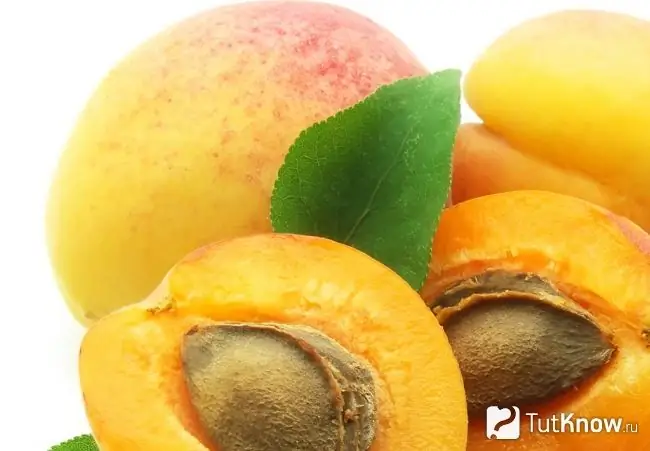- Author Arianna Cook cook@women-community.com.
- Public 2024-01-12 17:55.
- Last modified 2025-01-23 09:40.
Useful and harmful properties of apricot. What vitamins and microelements it contains and what is its calorie content for our body. The content of the article:
- Chemical composition
- Useful properties of fruits
- Harm and contraindications
Apricot (apricot) is a woody garden plant of the Rosaceae family. Fruits - fleshy or dryish drupes are eaten: they taste good, very nutritious and fragrant.
The "sun fruit" was born in northeastern China and more than 2 centuries ago from the Middle Kingdom it came to Central Asia and Armenia. Where it was taken from by Alexander the Great. The Romans called the apricot "Armenian apple". This name "armeniaca" has been preserved in botany.
Apricot came to Russia in the 17th century from the West. “Overseas” trees were planted in the Tsar's Izmailovsky Garden: “peach plums” and “apricot apples”. The word "apricot" itself was borrowed from the Dutch language in the Peter the Great era. Literally translated, apricus means "warmed by the sun." Read how to grow an apricot from a stone in your garden, as well as a recipe for how to make apricot jam with tangerine seeds and skins for the winter.
Apricot composition: vitamins, trace elements and calories

What else, besides a fascinating story and an interesting name, can this fruit boast of? Its fruits quickly satisfy hunger, enrich the body with vitamins and microelements.
What is included (calorie content per 100 g) of apricot:
- Calories, kcal: 41
- Fat - 0.1 g
- Proteins - 0.9 g
- Carbohydrates - 10, 8 g
The content of sugars in the pulp reaches 27%, due to which the fruits have a peculiar sweet taste. And tannins give them astringency. In addition, these fruits contain small amounts of starch, dextrin, and inulin. Citric, malic and tartaric acids and pectin.
Apricot is rich in vitamins that support health:
- Carotene - up to 16 mg%. This quantity is not found in any other Russian fruit.
- B vitamins - B1, B2, B6.
- Vitamin C in fresh apricot fruits is about 10%.
- Vitamins P and PP.
The fruits contain trace elements important for the body:
- Potassium salts about 305 mg
- Magnesium.
- Iron salts - 2.1% (absorbed by the body much better than from other sources).
- Calcium and Phosphorus.
- Iodine (especially a lot in Armenian varieties).
From 29 to 58% of fatty oil, similar in composition to peach and almond, is contained in apricot pits. This oil is widely used in cosmetics. In medicine, it is used to dissolve certain medicines.
Useful properties of apricot
The benefits of these fruits were known even in ancient China. Doctors of that era actively used the beautiful appetizing fruit to restore the vital functions of the body.

If you consume 100 g of fruits per day, you can improve digestion and metabolism. It is especially important to include apricot in the diet for people with diseases of the gastrointestinal tract, cardiovascular system and overweight. Due to the high iron content, these fruits are very useful for anemia.
Magnesium and phosphorus increase brain performance and improve memory. In addition, magnesium helps to quickly relieve high blood pressure. Therefore, apricot can be an excellent medicine for hypertensive patients. And calcium, which the fetus is also rich in, normalizes neuromuscular excitability.
It is a good source of beta carotene. This antioxidant has been shown to inhibit the development of cancer of the lungs, throat, stomach and esophagus. To get the required dose of vitamin A, it is enough to eat a few apricots, or drink 150 g of juice a day.
Apricot juice
easier to digest than fruits. It is very useful for pregnant women due to its high content of calcium and iron salts. It is very effective in treating dysbiosis and normalizes the acidity of the stomach.

Dried apricots contain easily digestible carbohydrates, as well as fresh fruits are rich in vitamins and microelements. And there are 6 times more potassium salts in dried apricots. This makes the fruit indispensable in the prevention and treatment of arrhythmias and heart failure. With inflammation of the kidneys, they remove toxins from the body.
Fatty apricot oil
successfully used as a cough remedy for laryngitis, bronchitis and even bronchial asthma.
The bark of the apricot tree is also curative. The broth is able to restore damaged brain cells after cerebrovascular accident.
Video about the benefits of dried apricots:

Harm and contraindications of apricot
It is not recommended to eat apricots with a reduced thyroid function and with hepatitis. The carotene contained in the fruits is not absorbed in such patients and therefore it is more advisable to take pure vitamin A.

With diabetes mellitus
you should not eat these fruits, as they contain a large amount of sucrose (in some varieties it reaches 80%).
Eating bitter apricot kernels can cause severe poisoning. The plant glycoside amygdalin (it is he who gives the bitterness) contained in them is broken down in the intestines and forms the strongest tissue poison - hydrocyanic acid. If the seeds are sweet, then they can be consumed, but not more than 20 g per day.
Video about the benefits of apricot, how to choose and how to store (watch the program from 20:40):






